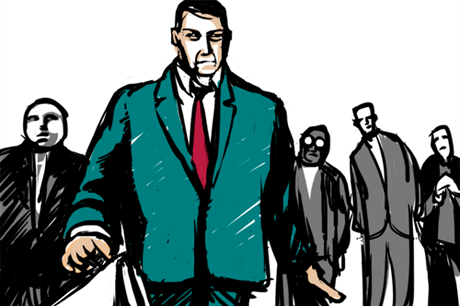Czech Police detective Lt. Col. Zdeněk Ondráček — who led investigations into the heavily criticized Opencard tender and suspected abuse of office by Supreme Audit Office (NKÚ) chief František Dohnal — left the Unit for Combating Corruption and Finance Crime (ÚOKFK) in October 2010 after more than 22 years on the job. A few months later, a 15-year veteran of the force, Lt. Col. Petr Vincenz of the operations division, followed suit.
Although Ondráček and Vincenz, who have both found work in the private sector, did cite low wages as a factor, their main reason for quitting the ÚOKFK — like many other experienced detectives before them, and others soon to come, according to Czech Position’s information — was the frustration at not being able to effectively investigate cases of corruption.
Sick of it all
Drawing perhaps the most media attention was the departure of detective František Zahálka, who was long on sick leave and filed an application to retire as of November 30. His imminent departure confirmed rumors that a key figure in the probe of alleged corruption around the Czech army’s purchase of Pandur armored personnel vehicles (APCs) from Austrian arms maker Steyr was frustrated with how the investigation was moving forward.
According to police security experts, Zahálka has a deep understanding of the complex case around the Kč 14.4 billion purchase of 107 Pandurs, which involves some of the biggest names in Czech politics and business of recent years. The Czech daily Právo pointed to the likely reason behind Zahálka’s departure: The Police Inspectorate is trying to discover how the identity of a state’s witness in the Pandur case, former Steyr manager Stephan Szücse, was leaked to the media, and carried out a search of Zahálka’s office; it was shortly thereafter that he went on sick leave.
Czech daily Mláda fronta Dnes reported that the state security service BIS played a role in the anticipated resignation of Petr Krömer, head of the investigative team that dealt with the purchase of Tatra trucks (at the center of bribery accusations against Martin Barták, an ex-defense minister, by US supervisory board member William J Cabannis, the former US Ambassador to Prague). The BIS reportedly spread news of Krömer’s disloyalty to his superiors, who began to doubt him. Although Krömer declined to comment on the issue, ÚOKFK chief Tomáš Martinec said his resignation was not yet official.
Also taking sick leave was investigator Jiří Mazánek, who dealt with controversial army tenders concluded when Barták was at the Ministry of Defense, including the case of allegedly overpriced CASA transport planes, Respekt reported.
Representatives of the Czech Police and Interior Ministry say they are confident that investigations into these high-profile corruption cases will not be undermined by the recent wave of departures of experienced investigators. “The Pandur team has taken on another investigator, and we will be able to conclude the investigation,” Martinec told the investigative weekly. “And if someone has a long-term illness, another investigator will continue the work.”
Who stays on? Pastors and teachers!
The ÚOKFK is divided into six departments dealing with various forms of corruption — such as European Union interests; serious economic crime; taxation and money laundering — and with various responsibilities — department of the directorate, international cooperation and methodology, and analysis and informatics — with Martinec (who has also come under fire for allegedly obstructing a corruption probe) at the helm.
Speaking on the Czech public television (ČT) program “Questions of Václav Moravec”on Sunday (Oct. 2) he told the host that in September nearly 700 police officers resigned. Czech Position has yet to receive an answer from the ÚOKFK as to how many of them worked for the elite unit.
In any case, it is clear that the detectives and investigators do not share Martinec’s optimistic view that their work will carry on at the same level. Just studying a file can take weeks. And when people speak about a “team” of investigators, these are often comprised of only one or two people.
“The documentation related to the more complex cases run to thousands of pages — in many cases even more than 10,000,” an ÚOKFK policeman who requested anonymity told Czech Position. “The first reading is to figure out what’s going on. After the second reading, you assess and remember the basic information. Only on the third reading are you able to start to construct the network of relationships [between players].”
A number of detectives leaving the police force have told Czech Position that, like Ondráček and Vincenz, the meager salary was not the main reason for their departures but the feeling that they could not effectively perform their duties to investigate corruption, given the resources (mainly personnel) at hand. Furthermore, much of their working hours had to be devoted to administrative chores. Unlike judges, ÚOKFK investigators have no assistants to do such work for them.
“The department will eventually only be staffed by former pastors and teachers, i.e. people who would otherwise be useless,” said one detective with a bit of ironic hyperbole.


